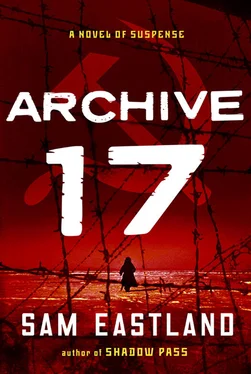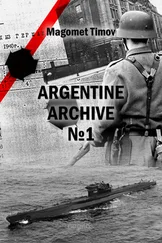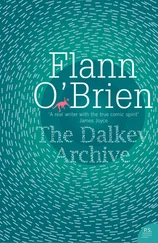Sam Eastland - Archive 17
Здесь есть возможность читать онлайн «Sam Eastland - Archive 17» весь текст электронной книги совершенно бесплатно (целиком полную версию без сокращений). В некоторых случаях можно слушать аудио, скачать через торрент в формате fb2 и присутствует краткое содержание. Жанр: Исторический детектив, на английском языке. Описание произведения, (предисловие) а так же отзывы посетителей доступны на портале библиотеки ЛибКат.
- Название:Archive 17
- Автор:
- Жанр:
- Год:неизвестен
- ISBN:нет данных
- Рейтинг книги:3 / 5. Голосов: 1
-
Избранное:Добавить в избранное
- Отзывы:
-
Ваша оценка:
- 60
- 1
- 2
- 3
- 4
- 5
Archive 17: краткое содержание, описание и аннотация
Предлагаем к чтению аннотацию, описание, краткое содержание или предисловие (зависит от того, что написал сам автор книги «Archive 17»). Если вы не нашли необходимую информацию о книге — напишите в комментариях, мы постараемся отыскать её.
Archive 17 — читать онлайн бесплатно полную книгу (весь текст) целиком
Ниже представлен текст книги, разбитый по страницам. Система сохранения места последней прочитанной страницы, позволяет с удобством читать онлайн бесплатно книгу «Archive 17», без необходимости каждый раз заново искать на чём Вы остановились. Поставьте закладку, и сможете в любой момент перейти на страницу, на которой закончили чтение.
Интервал:
Закладка:
“What are you doing?” asked Poskrebyshev.
“Comrade Stalin seems particularly agitated today.”
Poskrebyshev looked at the ugly black box, as if by force of will he might return the object to its original position. Then, slowly, he raised his head until he was staring at Pekkala. Could he possibly have figured it out? wondered Poskrebyshev. What are you thinking? asked the voices in his head. It’s Pekkala. Of course he has figured it out! A sense of imminent doom surrounded Poskrebyshev, but only for a moment, because he noticed Pekkala was smiling.
“And how is the weather in Archangel today?” asked the inspector.
By the time Poskrebyshev remembered to breathe, Pekkala had already gone.
Melekov had just finished installing a new phone in the commandant’s office. His hands were sticky from the electrical tape he had used to bind the wiring. As he wiped his fingertips on his shirt, Melekov looked around the room. Most of Klenovkin’s possessions had already been stolen by various guards who came to see the bullet hole, almost hidden by the peacock fan of blood which had sprayed across the wall.
Now the bullet hole had been repaired and the blood had been painted over, although, Melekov noted, both were still visible if he stared at the place for a while.
With a few minutes to spare before he had to be back at the kitchen, Melekov sat down in Klenovkin’s chair and put his feet up on the desk. Then, from his trouser pocket, he pulled out a cheese and cabbage sandwich.
Halfway through his first mouthful, the telephone rang, shattering the quiet of the room.
Caught by surprise, Melekov leaped out of his chair, which tipped over backwards and crashed to the floor.
Immediately, the phone rang again, its deafening clatter filling the air.
Melekov snatched the receiver out of its cradle and pressed it to his ear.
“Hello!” called a voice at the other end. “Hello? Is anyone there?”
“Yes …”
“Who are you?” demanded the voice.
“Who are you ?” asked Melekov.
“This is Vladimir Leonovich Poskrebyshev. I am calling from the Kremlin with a message for somebody named Melekov. Do you know him?”
“I am him.”
“Well, as of this moment, Comrade Melekov, you are the temporary commandant of the Borodok Labor Camp.”
Melekov felt his heart clench, like a little half-inflated balloon grasped in the hand of an angry child. “Commandant?”
“Temporary Commandant,” Poskrebyshev corrected him. “Although, the way things work, it might be years before Dalstroy finds a replacement.”
“When do I begin?”
“You have already begun! The appointment is effective immediately. Congratulations. Long live the Motherland.”
“Long live-” Melekov began.
But Poskrebyshev had already hung up.
Melekov replaced the phone receiver. Silence had fallen once more upon the room. He placed the chair upright and sat down again at the desk. His desk. Slowly, he laid his hands flat upon the surface. With fingers spread, Melekov stretched out his arms and slid his palms across the wood, as if to anchor himself to the world.
There was a heavy knocking on the door.
Melekov waited for someone to do something and moments passed before he realized that the someone should be him. “Come in!” he shouted.
Gramotin stuck his head into the room. “What are you doing in here?”
“I am the new commandant.”
“The hell you are,” said Gramotin.
Melekov nodded towards the phone. “Go ahead. Call the Kremlin. Ask them.”
Nervously, Gramotin licked his lips. He realized Melekov must be telling the truth, for the simple reason that Melekov lacked the imagination, not to mention the audacity, to conjure a lie of such proportions. “All right,” said Gramotin, “then I suppose you’d better tell me what I’m to do with the body of our former commandant.”
“Where is he now?”
“In the freezer.”
Melekov thought for a second. “Put him in a barrel. Ship him out.”
Gramotin could not help but be impressed. “You cold-blooded bastard,” he said.
Melekov ignored the compliment. “And when you’re finished,” he continued, “you can take the rest of the day off.”
Gramotin nodded respectfully. This might work out after all, he thought.
“What was it like out there?” asked Melekov.
“Out where?”
“In the forest of Krasnagolyana. They say that place is haunted. You were out on your own a long time. Did you see anything?”
“Nothing at all, Commandant.”
A retired middle-school biology teacher was fishing for carp with a bamboo pole off a bridge over the Novokislaevsk River north of Moscow. No sooner had he begun when he snagged his hook on the bottom and had to cut the line. He tied on a new hook and, a few minutes later, snagged that one as well. When the same thing happened a third time, the teacher swore magnificently, threw down the pole, and waded out into the lazy current, determined to retrieve his lost hooks.
As he reached down into the murky water, his fingers swept through the weeds and brushed against the soft pulpiness of rotten wood. It was only when his fingers touched the buttons of a coat that he realized that he had in fact been touching hair and the skin of a decomposing face.
The teacher staggered backwards out of the stream and stood dripping on the bank, wondering what to do next. He knew he ought to call the police and let them see to it, but as a teacher of biology, he was curious to see for himself what he had only read about in books. After looking around to make sure he was alone, he waded back into the water and wrestled the body up onto the bank. Streams of dirty water poured from the dead man’s pockets, sleeves, and trouser legs.
The corpse was that of a man who appeared to have been lying in the water quite some time. His skin had turned a washed-out grayish white and his eyes had seemingly flattened out and sunk back into the skull. He was wearing a heavy black coat with wide lapels.
Crouching over the body, the professor grasped the man’s jaw, opened the mouth, and looked inside. Then he fetched a little stick, got down on his hands and knees, and poked around in the man’s ears. He touched the dead man’s eye and pinched his cheek and flexed all the joints of his fingers.
His curiosity now satisfied, the teacher ran off to find a telephone and call the police, but not before he had retrieved his hooks from where they had snagged in the man’s clothing.
Police identified the man as Vojislav Kornfeld, a known NKVD assassin. His body was taken to a morgue on Lominadze Street, where the doctor on duty found no signs of injury to the body. No trauma. No defensive wounds. No poison detected in his system. Although water was present in his lungs, the absence of lactic acid in his blood seemed to rule out drowning.
The cause of death was listed as “undetermined.”
Further inquiries by the Moscow police yielded no results.
After six weeks, his body was cremated and the ashes scattered in a vacant lot behind the abandoned Skobelev hotel.
On a bright winter’s morning at the Borodok railhead, a shipment of fifteen tons of lumber from the Valley of Krasnagolyana was loaded onto flatbeds, headed for the west. Included in the shipment were a dozen oil barrels stenciled in bright green letters with the name DALSTROY.
Packed into one of these barrels was former Camp Commandant Klenovkin, hands folded on his chest and knees drawn up to his chin. Jostled by the movement of the train, Klenovkin’s hair waved back and forth like seaweed in the tide of preserving fluid. Sealed in the darkness of that iron womb, the expression on his face was almost peaceful.
One week later, Klenovkin’s barrel arrived at the Center for Medical Studies of Sverdlovsk University, where it was immediately assigned to a newly arrived medical intern for use as a cadaver. Having collected the barrel from the shipping department, the intern loaded it onto a handcart and proudly wheeled it across to the laboratory where he and his classmates would soon begin dissections. He even took the long way around, so that everyone could see. The barrel was heavier than he’d expected. By the time he reached a deserted courtyard on the outskirts of the campus, the intern needed a rest. Propping the handcart against a wall, he lit himself a cigarette and sat down on an empty concrete platform, placed there many years ago for a statue which never arrived.
Читать дальшеИнтервал:
Закладка:
Похожие книги на «Archive 17»
Представляем Вашему вниманию похожие книги на «Archive 17» списком для выбора. Мы отобрали схожую по названию и смыслу литературу в надежде предоставить читателям больше вариантов отыскать новые, интересные, ещё непрочитанные произведения.
Обсуждение, отзывы о книге «Archive 17» и просто собственные мнения читателей. Оставьте ваши комментарии, напишите, что Вы думаете о произведении, его смысле или главных героях. Укажите что конкретно понравилось, а что нет, и почему Вы так считаете.











